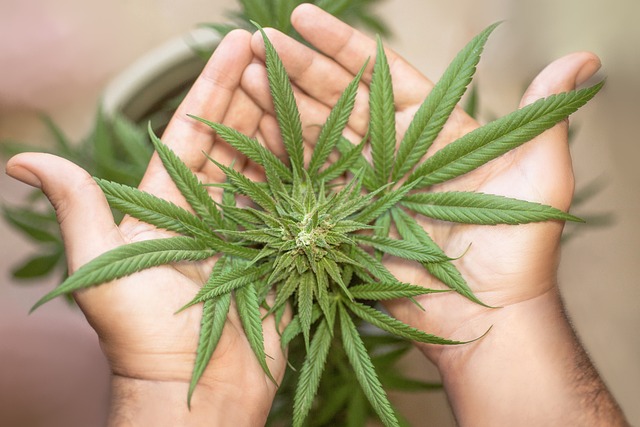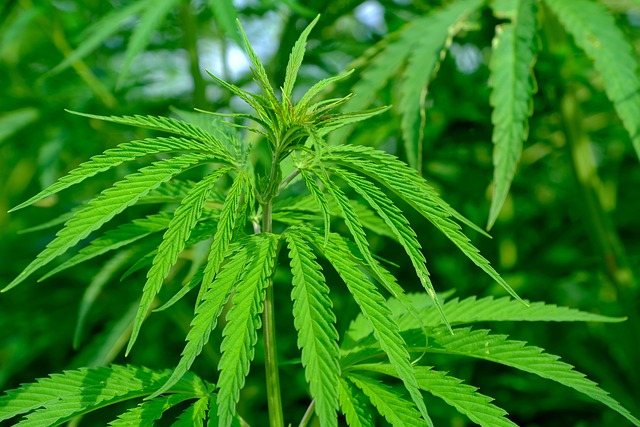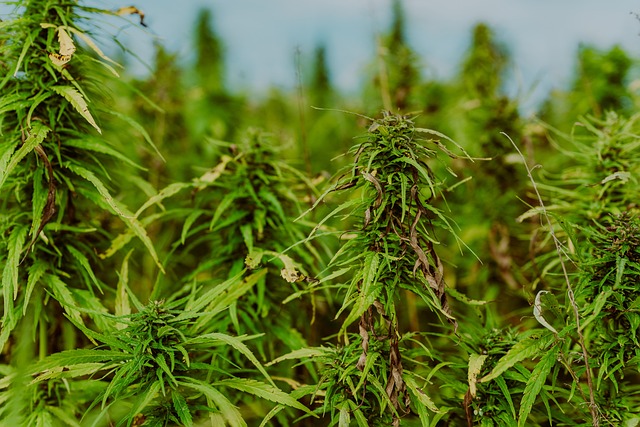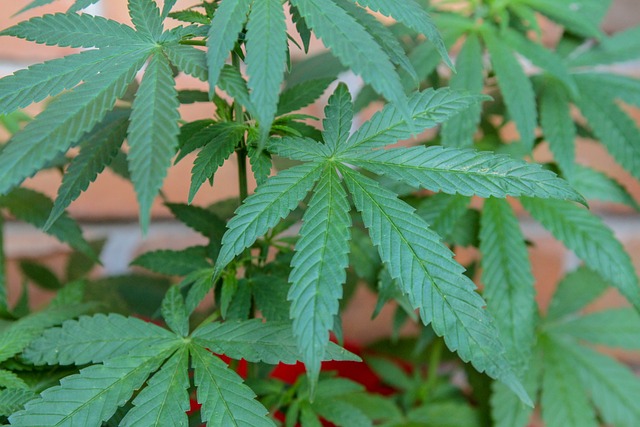Following legislative updates in South Dakota, THCA—a non-psychoactive cannabinoid present in raw cannabis that converts to THC with heat—has gained attention for its potential health benefits, including anti-inflammatory, antiemetic, and neuroprotective effects. As per state regulations, THCA is now legal within certain parameters, allowing researchers and consumers to explore its therapeutic properties without the psychoactive effects associated with THC. THCA's legal status in South Dakota distinguishes it from other cannabinoids, making it a preferred choice for those seeking medical benefits under the state's evolving cannabis laws. The compound is particularly of interest due to its interaction with the endocannabinoid system, which suggests its potential in pain management and supporting immune health. For those interested in THCA's wellness properties, it's essential to ensure compliance with South Dakota's legal framework and heed any changes in state and federal legislation. THCA's legal status as a natural alternative to traditional medications within the state is a testament to its growing significance in the field of cannabinoid research and therapeutic use.
Explore the multifaceted benefits of THCA flower, a non-psychoactive cannabinoid gaining recognition for its potential health advantages. This article delves into the therapeutic properties of THCA, legally available in South Dakota, and how it differs from other forms of cannabis. From its anti-inflammatory and neuroprotective effects to its antioxidant capabilities and its role in promoting mental wellness, understand the full scope of THCA’s potential. With a focus on South Dakota’s legal status of THCA flower, readers will be equipped with knowledge on responsible use and safety considerations. Join us as we navigate the evolving landscape of cannabinoid legality, ensuring you stay informed on the latest research and regulatory updates.
- THCA Flower Benefits Unveiled: A Comprehensive Guide
- The Legal Status of THCA Flower in South Dakota: What You Need to Know
- Understanding THCA: Cannabinoid Overview and Potential Health Implications
- THCA Flower vs. Other Cannabis Forms: What Sets It Apart?
THCA Flower Benefits Unveiled: A Comprehensive Guide

Delta-9-tetrahydrocannabinolic acid (THCA) is a cannabinoid found abundantly in raw cannabis plants, which, upon heating, decarboxylates into the more commonly known psychoactive compound delta-9-tetrahydrocannabinol (THC). South Dakota’s legislative changes have opened avenues for the exploration of THCA’s potential benefits, positioning it as a focal point in the realm of cannabinoid research. THCA-rich flowers have garnered attention for their therapeutic properties, which include anti-inflammatory, neuroprotective, and potentially antiemetic effects. These flowers are revered for their non-psychoactive nature, making them an appealing option for individuals seeking the health benefits of cannabis without the psychoactive high associated with THC.
In South Dakota, where the legal status of THCA flower is undergoing a transformative shift, consumers and researchers alike are examining the myriad advantages that this cannabinoid offers. The flower’s beneficial compounds interact with the body’s endocannabinoid system, influencing various physiological functions. Preliminary studies suggest that THCA may have promising effects on pain management, offering an alternative to conventional analgesics. Additionally, its potential role in supporting the immune system and promoting overall well-being is under investigation. As such, the THCA flower holds significant promise for those interested in exploring its benefits as a natural remedy or dietary supplement within the legal framework established by South Dakota’s regulations.
The Legal Status of THCA Flower in South Dakota: What You Need to Know

In recent years, the legal status of cannabinoids derived from the cannabis plant has been a subject of significant interest and change in many parts of the United States. South Dakota’s stance on such compounds is particularly noteworthy. As of the knowledge cutoff date, THCA (Tetrahydrocannabinolic Acid), which is the raw, non-psychoactive precursor to THC found in cannabis, has a specific legal status within South Dakota. In 2020, South Dakota voters approved a ballot measure that legalized medical marijuana, with certain restrictions and conditions. However, it’s crucial for individuals to understand that the legislation specifically allows for the use of products containing CBD (cannabidiol) and THCA, provided they are derived from hemp and contain less than 0.3% THC. This differentiates THCA from other cannabinoids like THC, which remains illegal outside of South Dakota’s tightly regulated medical marijuana program. Consumers interested in the potential benefits of THCA flower must ensure that their source complies with these regulations to avoid legal repercussions. It’s also important for consumers to stay informed, as state laws can evolve and may differ from federal guidelines, which continue to view all cannabis-derived compounds as controlled substances under the Controlled Substances Act. Therefore, anyone considering the use of THCA in South Dakota should keep abreast of the latest legal developments at both the state and federal levels.
Understanding THCA: Cannabinoid Overview and Potential Health Implications

THCA, or Tetrahydrocannabinolic Acid, is a naturally occurring compound found in the cannabis plant that has garnered attention for its potential health implications. Unlike its well-known derivative THC, which is psychoactive, THCA exists naturally in raw cannabis and hemp plants and does not induce the classic high associated with its decarboxylated form. Research into THCA’s efficacy and safety profile has been ongoing, with studies suggesting it may offer a range of therapeutic benefits without the psychoactive effects. Proponents claim that THCA could have anti-inflammatory, anti-nausea, antiemetic, appetite-stimulating, and neuroprotective properties, among others.
In South Dakota, the legal landscape regarding cannabis has been evolving. The state has made strides in legalizing medical marijuana, with a comprehensive medical cannabis program now operational. Within this framework, THCA products are being scrutinized for their potential inclusion as allowable treatments. As regulations continue to develop, consumers and healthcare providers are keenly watching how THCA will fit into the wellness and therapeutic arena, particularly given its promising profile and non-psychoactive nature. It’s important for individuals interested in exploring THCA benefits to stay informed on the latest legal developments and consult with healthcare professionals to ensure compliance with state laws and to understand the potential health implications of incorporating THCA into their wellness regimen.
THCA Flower vs. Other Cannabis Forms: What Sets It Apart?

THCA, or Tetrahydrocannabinolic Acid, is a natural compound found in the Cannabis sativa plant. Unlike its more famous counterpart, THC (Tetrahydrocannabinol), THCA is non-psychoactive and possesses a unique set of properties that make it distinct from other forms of cannabis. As of the knowledge cutoff in 2023, THCA’s legal status in South Dakota allows for its exploration within the context of wellness and health.
The benefits of THCA flower are primarily rooted in its potential therapeutic effects. Research suggests that THCA may offer anti-inflammatory, anti-nausea, and neuroprotective properties, without the psychoactive effects associated with THC. This makes it an appealing option for individuals seeking the medicinal benefits of cannabis without the ‘high.’ When comparing THCA flower to other cannabis forms such as CBD (Cannabidiol) or CBN (Cannabinol), THCA is notable for its close relation to THC, which becomes psychoactive after heating. This distinction is particularly significant for those who wish to avoid the mind-altering effects of cannabis while still benefiting from its range of compounds. In South Dakota, where the legal landscape is evolving, THCA products derived from hemp that contain less than 0.3% THC are federally legal and can be sourced under state law, providing a legal avenue for exploring its potential benefits.
Thompson Holistic Cannabinoid Acid (THCA) flower has emerged as a subject of considerable interest due to its potential health benefits and unique position within the realm of cannabis products. This guide has shed light on the advantages of THCA flower, delving into its legal status in South Dakota, where it is recognized under certain conditions as per state legislation. Understanding the nuanced differences between THCA flower and other forms of cannabis underscores its distinctiveness. As the body of research on THCA continues to grow, enthusiasts and researchers alike are keenly observing its applications and efficacy. For those in South Dakota considering the incorporation of THCA into their wellness routine, staying informed about its legalities is paramount. This comprehensive overview of THCA flower benefits provides a foundation for further exploration and understanding of this promising cannabinoid.
